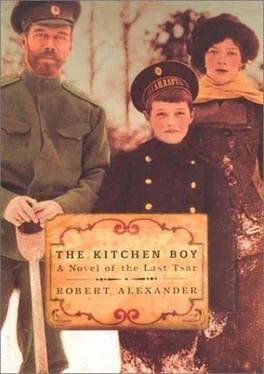And then, of course, began our long wait in The House of Special Purpose.
There are so many things, Katya, that I have never told you nor even my very own son – your father – but I had been with the Romanovs since shortly before they were exiled to Siberia. My own father – your great-grandfather – was off to war, and the food situation at home in the Tula province was difficult, so when my Uncle Vanya wrote to my mother and suggested I come to work at the Aleksander Palace in July of 1917, I was sent right away. We were a poor family, and my mother was only too glad to have one less mouth to feed, particularly during such horrible times.
I arrived by the end of the month, a fortnight before the Romanovs were sent from their home in Tsarskoye Selo, a suburb of Sankt-Peterburg. The Tsar and his consort had many years earlier decided to make this their principal home, for there the air was clean and fresh, the gardens lush, and of course they were far away from the capital and decadent society. In essence, overwhelmed with the poor health of the Heir Tsarevich, they withdrew, which in the end actually precipitated their fall.
Of course, another reason they withdrew from Peterburg was fear for their safety. Since the uprisings of 1905, political assassinations had been all too common. Indeed, during those times the whole of the House of Romanov feared for its life, realizing that the anarchists were intent on exterminating the dynasty. In retrospect, I often wonder how Nikolai could not have foreseen so dark a storm as 1918 – almost everyone else did – but again I’m sure he was blinded by religion.
For as rich and all-powerful as they were, the Emperor and Empress decided not to make their home in the Great Palace of Tsarskoye, an enormous palace built by Catherine the Great herself. That one had hundreds upon hundreds of grandiose rooms all decorated with gold and marble and crystal chandeliers. Instead, Nikolai and Aleksandra wanted a family home, so they chose the nearby and substantially more modest Aleksander Palace, which Catherine had built for her favorite grandson, the future Aleksander I, the one who trounced Napoleon. Nikolai II himself was born there, and the last Tsar and Tsaritsa chose not the entire palace, but only one wing for their apartments. Sure, they still had many rooms, and spectacular they were, for they gutted the left wing and redecorated a number of rooms in the stijl moderne , otherwise known in the West as Art Nouveau. It was there too, in a vitrine in her mauve boudoir that Aleksandra kept her Fabergé eggs, which along with all her pearl necklaces and diamond tiaras and her bejeweled this and that totaled so many millions upon millions of dollars. In today’s dollars a billion, I think. Perhaps a bit more, perhaps a bit less. I should add that when they were exiled to Siberia, the Provisional Government, which ruled for eight months before being toppled by the Reds, allowed Nikolai and Aleksandra to take everything but the Fabergé objets with them. They took two suitcases full of gems, to be exact. And it all disappeared, all of the jewels except the nineteen pounds of diamonds and things found hidden on their bodies when they were killed. While the Romanovs were under arrest in Tobolsk – months before they were brought to Yekaterinburg – many nuns visited them, and these sisters of God smuggled everything else away. Stalin initiated a big search in the 1930s, and after torturing a few nuns and such the Reds found one of these suitcases buried beneath a hut. It contained one hundred and fifty gems, including a 100-carat diamond brooch and a 70-carat diamond crescent. Alas, the second suitcase has never been located. It’s supposed to contain one pood – about thirty-six pounds – of diamonds and rubies and emeralds. As far as anyone knows, it’s still buried somewhere in the taiga of Siberia.
It was during my short time at the Aleksander Palace that I came to understand several fundamental things about Tsaritsa Aleksandra Fyodorovna.
My work was in the kitchens, and I was never allowed close to the Imperial Family until the night before we departed the Aleksander Palace, when so much was being packed up for the long train ride – to where, no one at that time knew. Because their English cousins proved to be nothing but ninnies by withdrawing their offer of asylum – which would have saved the Romanovs – we knew we weren’t being sent abroad. In truth, actually, that was a relief to the family, all of whom hoped and prayed that we were being exiled to their favorite palace, Livadia, in the Crimea. But that was not to happen, of course, because between Peterburg and the Black Sea stood the raging mobs of Moscow. As it was, we didn’t realize we were being sent to Siberia until the train was hours underway.
In any case, I was enlisted to help carry the luggage and trunks and crates, a parade of things that went on through the night. It was only then that I entered the Emperor and Empress’s private bedchamber. It was a large room with soaring ceilings, white wallpaper covered with pink garlands of the Empress’s favorite flower, hydrangea, the design of which was carried onto the curtains and the chintz fabric covering all the painted furniture. Very bright. Very elegantno . I didn’t know it then, for I was so young and unworldly – a mere lad from the provinces – but this was pure English style, the Empress’s favorite, a taste acquired, of course, at the court of her granny. Yet all of this beauty was not what impressed me so. What first astounded me was the number of photographs, pictures of aunts and uncles and cousins and children that covered the walls and virtually every tabletop. Such was the importance of family to her. But then I saw her obsession, her sickness – all the icons. The walls of their sleeping alcove were covered from floor to ceiling with hundreds of religious pictures. Pictures of the Virgin Mary. Saint George the Dragon Slayer. Saint Nicholas. Saint Michael. Big, silver-covered icons. Little jewel-encrusted portraits of every saint imaginable. On and on. There was not a square inch that was not covered with an icon through which God was supposed to work, a window for him to reach from the high heavens to the lowly earth. Aleksandra was continually arranging and rearranging them too, as if she only had to get the order correct for God to hear her fervent prayers. Nyet, nyet , not normalno . Not at all. Even I recognized this, young as I was. She was more than a fool for God. She was a fanatic. Why, after giving birth to four daughters she was desperate to bear a boy, an heir, and to achieve this she had the monk Serafim of Sarov canonized. And after that grand ceremony Nikolai and Aleksandra crept down to the spring where the monk was known to have worked miracles hundreds of years earlier. And there, in the dead of night, they bathed naked, just the two of them. The next day there were a number of known miracles – children healed of terrible maladies, a blind woman who regained her sight, an invalid who walked for the first time in ten years – and soon thereafter Aleksandra became pregnant with Aleksei. Some say it was an act of God Himself, but why would he do such a dark thing, give Russia such a troubled heir? Rather, I think it was this inescapable Russian fate.
But, sure, while our Empress was cold on the outside, she was at the same time wildly passionate on the inside, and in this way so very, very Russian. In the carnal sense, she and the Emperor were the most loving of couples; in their early letters to one another there is even mention of their pet names for their genitalia. And this, from a granddaughter of that tight Victoria! Radi boga – Dear Lord – Aleksandra must be rolling in death, knowing that those pet names for their privates have been published around the globe!
Читать дальше












